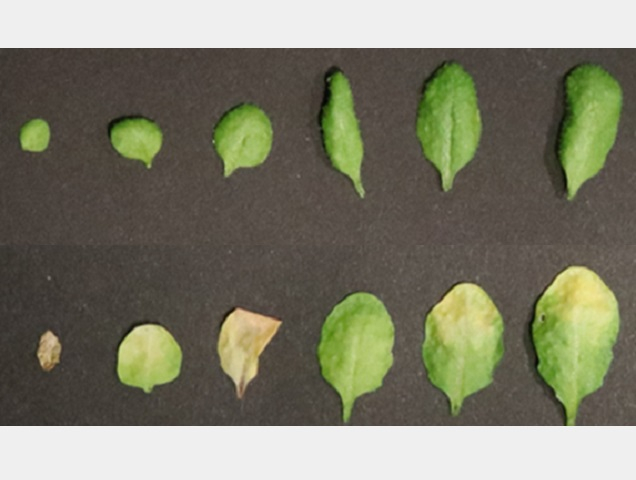Research News
May 30, 2025
- Agriculture
New plant leaf aging factor found
Mutant protein protects against mildew, but leaves turn yellow and age sooner
Accelerated aging
Wild-type Arabidopsis thaliana, top row, compared to the plant with a mutation.
Osaka Metropolitan University

Resistance to disease should mean a longer life, but researchers have found that a mutant protein that helps a plant fight mildew might make it age sooner.
The Osaka Metropolitan University research team of Graduate School of Agriculture student Tomoko Matsumoto and Professor Noriko Inada and Graduate School of Science Professor Koichi Kobayashi discovered that thale cress (Arabidopsis thaliana) plants with the mutant Actin Depolymerizing Factor protein turn yellow sooner over time and in dark conditions compared to wild-type thale cress.
“ADFs are involved not only in leaf aging but also in disease response and plant growth control,” Professor Inada explained. “Further elucidation of the function of ADFs can help contribute to crop yield improvement and enhanced sustainability of agricultural production.”
Funding
This work was supported by Ohsumi Frontier Science Foundation, the NOVARTIS Foundation (Japan) for the Promotion of Science, Yamada Science Foundation (for N.I.), Grant-in-Aid for Scientific Research (KAKENHI, 24K09518 for N.I. and 22H05076 for K.K.), the Sasakawa Scientific Research Grant from The Japan Science Society (for T.M.), and JST SPRING Grant Number JPMJSP2139 (for T.M.).
Paper information
Journal: Plant and Cell Physiology
Title: Arabidopsis thaliana ACTIN DEPOLYMERIZING FACTORs play a role in leaf senescence regulation
DOI: 10.1093/pcp/pcaf027
Authors: Tomoko Matsumoto, Koichi Kobayashi, Noriko Inada
Published: 30 May 2025
URL: https://doi.org/10.1093/pcp/pcaf027
Contact
Noriko Inada
Graduate School of Agriculture
Email: norikoinada[at]omu.ac.jp
*Please change [at] to @.
SDGs

